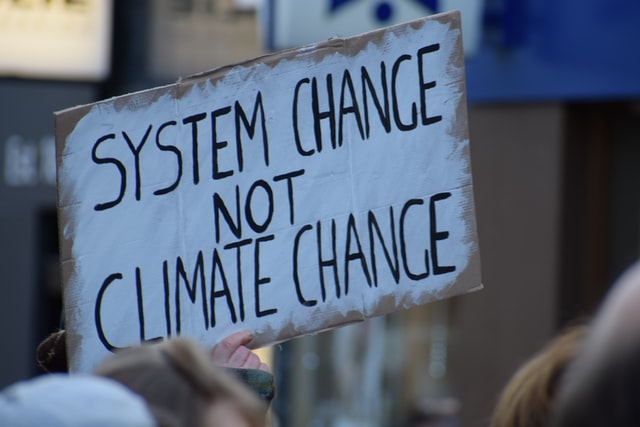
Is capitalism causing climate change?
By Aileen Murphy
‘Save electricity, recycle, buy sustainable brands, use public transport, eat less meat.’ These are some of the few things we constantly hear to prevent climate change and are used as ways to pin this on the greater population. But when we look closer at it, who’s really to blame? Capitalism.
Throughout our time on earth, humans have gradually changed our natural environment through the rise of capitalism and new modes of production, which as Marx describes, “comes dripping from head to foot, from every pore, with blood and dirt.” Capitalism can be claimed as the main cause of global warming and effectively the climate crisis, reducing the life span of many species on earth. Therefore, it is only right to try and reform capitalism or further try and remove it to save the state of the earth for future generations.
Capitalism, as defined by Field (2018) is an economic system in which the ultimate goal is to make profit. Companies therefore compete with one another to make more profit, producing and selling more goods in factories, using machines and large amounts of energy and electricity. As a result, there is a huge increase in demand for energy down to capitalist interests, resulting in gases being released into the air and warming up the average temperature of the earth. As fossil fuels are burned to create energy in power plants, significant amounts of carbon dioxide are released increasing the surface temperature, causing climate change, and increasing the likelihood of natural disasters. The mega-rich through private jets and helicopters are merely adding to the collapse of the environment and yet will be the ones who remain safe as the world will eventually collapse through the climate crisis, effectively impacting the lower classes more and protecting capitalist interests once more.
Fast fashion is another source of capitalist interests which contributes to climate change, producing a major amount of the world’s emissions. Fast fashion creates lots of air and water pollution, by releasing several greenhouses gases, accounting for 20% of global wastewater whilst contributing to 10% of global carbon emissions. Certain materials used within fast fashion such as polyester are very damaging to the environment, taking hundreds of years to eventually decompose. Further through its carbon footprint, which is around double that of other materials such as cotton, it is a damaging but cheap resource used for mass production within fast fashion. Simply, one of the biggest problems when it comes the impact of fashion on the environment is how much we throw away. It is very common for people to buy outfits just to wear them once, resulting in lots of fashion ending up in the bin. Fast fashion also creates microtrends, leading to overconsumption and overproduction of clothes, and eventually significant waste. Regarding the manufacturing, many western brands often pay for their clothes to be made in factories based in developing countries, where production is cheaper, and regulation is less strict. Fashion is also affecting our oceans and according to the International Union for Conservation of Nature (IUCN), 35% of all the non-biodegradable microplastics in the ocean are there because of synthetic fabrics that have been made by the fashion industry. https://www.ovoenergy.com/guides/energy-guides/how-fast-fashion-impacts-the-environment
Food waste is another element to climate change as rotting waste can cause the release of greenhouse gases. Within the UK, millions of food products are wasted everyday due to overproduction and overconsumption from the public, with many people throwing food away or leaving it to go out of date. Due to capitalism and competition between companies, food production and waste is at a high with about a third of fruit and vegetables being rejected for being the wrong size or shape before it even reaches the shops. And when this food is thrown away, it rots and releases yet more greenhouse gases into the atmosphere. Production based on never-ending accumulation is the prime motor of the capitalist system as the less privileged lower classes and less developed countries face the effects of the climate crisis. But this does not have to continue to be the case- we must do something about the state of our society to prevent capitalism and try to save the future of our earth!

0 Comments